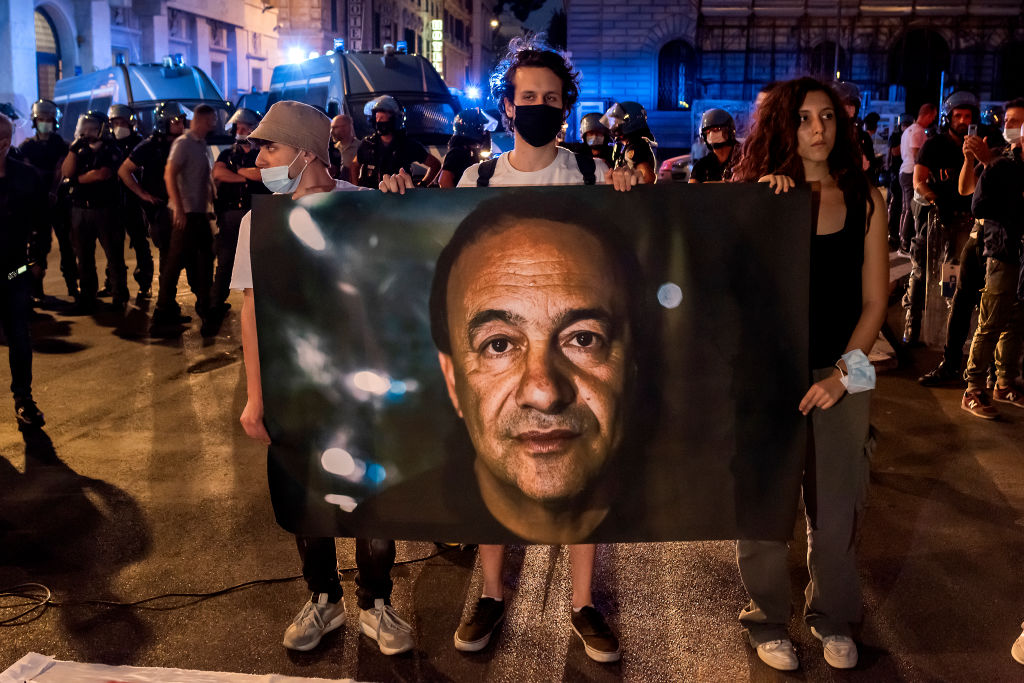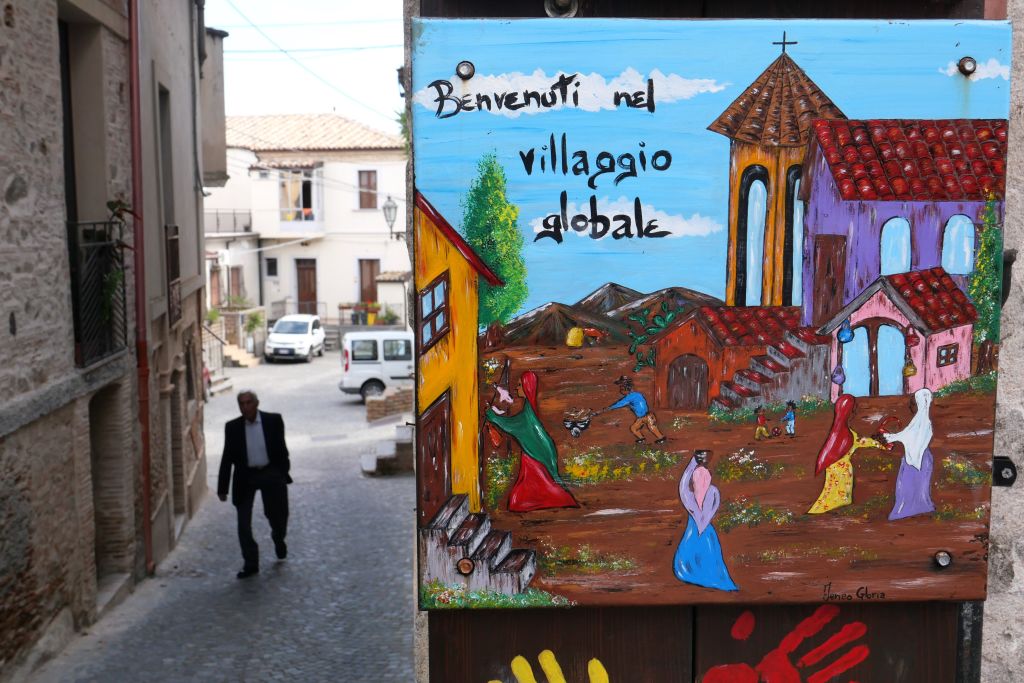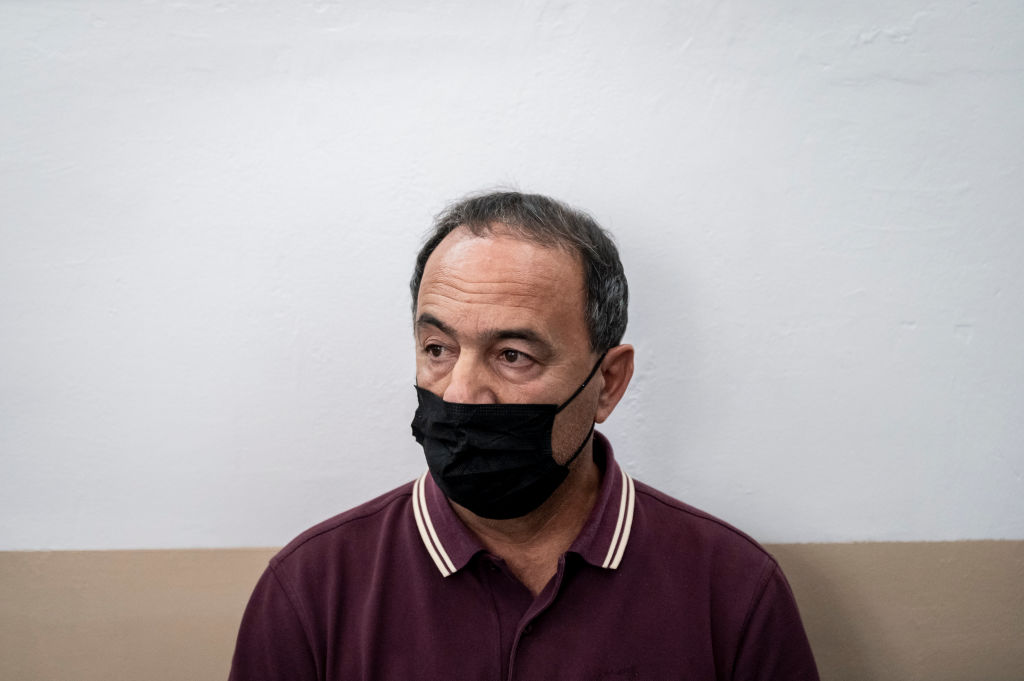On a warm evening in late September, two former mayors met in a law office in Locri, in Italy’s Southern region of Calabria. One of them was Domenico Lucano, known as “Mimmo,” the former mayor of Riace, a small town that has been celebrated worldwide for creating a visionary model for welcoming thousands of refugees. The other was Giuliano Pisapia, mayor of Milan from 2011 to 2016, and now a member of the European Parliament.
Lucano was awaiting a first-degree sentence as part of a trial known as “Xenia,” from the Greek xenos, or foreigner, in which he was the principal defendant and for which, in 2018, he was arrested, suspended from his position and temporarily barred from Riace. Prosecutors in Locri had charged him with allegedly abetting illegal immigration, with criminal association, fraud and embezzlement. Pisapia, who has been working as a lawyer for more than 40 years, is one of Lucano’s two defenders. “I asked him to meet to clarify a couple of points before entering the courtroom,” says Pisapia, “but he ended up talking about his ideals. He is a dreamer.”
Lucano’s dream was to bring an abandoned place back to life by welcoming migrants — creating a community in Riace where they could live and possibly work while seeking asylum. And for over a decade, his dream became a reality for countless people arriving in Italy in search of a better life.
Yet on Sept. 30, Lucano’s life became a living nightmare. Judges sentenced him to 13 years and 2 months in jail, far in excess of anything sought by prosecutors. Under Italian law, the judge’s reasons will be made known within 90 days of the sentence, but the defense has already expressed its intention to appeal. The sentence will be final only after two successive appeals.
“It’s an incredible judgment,” Pisapia said. “The risk is that it will compromise the credibility of the Italian judiciary, which has already decreased considerably in recent years. It’s a danger because trust in justice is one of the pillars of the democratic system.”
Outside the courthouse, Lucano, who was expecting to be acquitted, appeared shocked. “I don’t know if there are sentences like this for mafia crimes” he told reporters. In Calabria, a region infested by the ‘ndrangheta, judges have handed down more lenient sentences when faced with cases of murder or mafia-related crimes.
The following morning, speaking to TIME on the phone from Riace, Lucano sounded tired and sad, but still convinced that the decisions he made were necessary and right. “I may have gotten an administrative aspect wrong. But they put me in a position to do so, in a time of emergency, with people’s lives at stake”. In order to hear me, he had to put the speaker phone on because his cell phone is not working properly. “I don’t even have the money to buy one that works.”
Commenting on his sentence, Lucano highlighted that the people he helped were sent to Riace by the government. “They accuse me of criminal association, but then they ought to call out the Minister and the Prefecture. I helped people in need, and this is how the State is paying me back,” he said.

The fall of an ‘Outlaw’
Lucano’s sentence immediately triggered a fierce debate in Italy, reigniting a long-smoldering political clash over immigration policies, and raising concerns about the impartiality of the judiciary. In dozens of cities across Italy, hundreds of people took to the streets to express their dissent, while the leaders of the main political parties took sides immediately, ahead of local elections held on October 3-4.
From the left came mainly words of dismay and indignation for the severity of the sentence, while the right denigrated Lucano. Matteo Salvini, leader of the populist right-wing Lega party and a notorious promoter of anti-immigration laws, called him “the champion of the left-wing snobs.”
But the Riace experiment does not split political opinions quite so evenly. In fact, politicians across the spectrum have raised concerns about what Lucano did. For one thing, it challenges a system based on public contracts worth millions, with powerful interests attached. For another, it represents the assertion of local power over centralized power, run by a public official who allegedly ignored rules and regulations that he believed went against the principles of solidarity and humanity. While politicians on the right typically see this sentence as “an exemplary punishment” for a man who considers himself above the law, those on the left are chiefly concerned at the severity of the sentence.
Lucano, for his part, has never denied that he has sometimes put the defense of human rights before respect for the institutions of the state and the law — the title of his 2020 memoir is Il Fuorilegge, or The Outlaw. He has been accused of having organized a “marriage of convenience” between an Italian citizen and a woman who, unable to obtain documents, had become a victim of sex trafficking, and of issuing IDs to an Eritrean woman and a 4-month-old child whose residency permits had expired, so the infant could get access to health care. But the most serious crimes he is accused of are related to the mismanagement of public funds. Lucano allegedly allocated them in the way he considered most beneficial to the model he had created, and not necessarily with respect to where they might end up. For example, he used government money to renovate some of the empty houses to make them more livable for migrants, yet potentially making private properties more valuable.
His lawyer, Pisapia, says there is a distinction in Italian law between violating administrative rules and committing a crime. “According to our criminal code, whoever commits an act ‘to save himself or others from the danger of serious harm’ does not commit a crime.” What upsets Pisapia is that the court did not take into account how little Lucano himself benefited from his actions. “Lucano lives in poverty, I have seen it with my own eyes,” he says. “At the very beginning of the investigation, there were €9 in his bank account and he had no other money. It is absurd not to take that into consideration.”
The prosecution also claimed that Lucano acted in order to gain political advantage, to buy votes in the future. Yet once he was removed from the office of mayor in 2018, he declined the invitation to run for both the Italian and the European Parliaments, two seats that would have guaranteed him economic stability.
Pisapia has been Lucano’s lawyer only since January 2021, but he already knew Riace and the model under trial. Over the past 15 years, Riace has been the subject of hundreds of articles, books and films, including one by German director Wim Wenders. In 2010, Lucano was named the third best mayor in the world, following those of Mexico City and Oklahoma City. In 2016, Fortune included him among the 50 most influential world leaders.
But Pisapia knew Riace from personal experience as well, having visited the town in 2018 to witness its model at work. “As mayor, I experienced firsthand the enormous difficulties of integrating migrants, and that’s why I went to Riace. I knew that Lucano had the strength, courage and ability to put into practice principles of solidarity and hospitality in which I have always believed,” he said. “What seemed like a dream was in fact a reality, with an entire community involved.”

How Riace reawakened as a home for migrants
Like many other rural villages in southern Italy, Riace has been gradually emptying out since World War II. The village’s economy could not compete with the industrialization of northern Italy, nor the enticements beckoning from across the Atlantic. The oldest part of the town that once boasted 2,000 inhabitants fell to about 500 by the late nineties, most of them elderly.
“This was a place of departures that turned into a place of arrivals,” Lucano likes to say. His experiment began in 1998, when he was a chemistry teacher at a high school in a nearby town. The morning of July 16, while driving to work, he saw a crowd on the beach in front of Riace, and discovered that they were Kurdish refugees who had arrived from Turkey by boat.
Sensitive to their cause, Lucano decided to try to find accommodation for them and hit upon the idea of having them occupy some of the many empty houses in the village. He called a cousin who had left many years before to ask him if a Kurdish family could occupy his abandoned house. The cousin agreed. Lucano made another call, and then another. Phones of former Riace residents rang in northern Italy, in Brooklyn and New Jersey, as far away as Buenos Aires. Within days Lucano was able to give each of the new arrivals a roof over their heads.
The success inspired Lucano to found a nonprofit organization, Città Futura, which allowed him to borrow money to expand the program. He was elected mayor in 2004 on such a revolutionary platform that he says even his own father didn’t vote for him, yet he kept the position for three terms, until his arrest in 2018. As the head of Riace’s administration, he could take advantage of government funds provided through a program called SPRAR, later extensively downsized by the right wing politician Salvini.
When I visited Riace in 2016 to learn about its unconventional model, Lucano explained that the village received 35 euros a day in government funding for each refugee. “With that money we do everything.” He started listing what they managed to do, counting on his fingers, on two hands. “With this budget we provide housing, pay the bills, carry out maintenance, offer health care, schooling for the children, help with paperwork. We run workshops where local artisans share their knowledge with apprentice refugees, and both get paid.”
Some of the most creative and widely praised ideas Lucano implemented were among the most criticized by the prosecution that accused him of wrongdoing. His administration gave refugees a monthly “bonus” to buy groceries and other essential goods — letting them choose what they wanted to eat, while also ostensibly helping out the local economy. The bonus was distributed not in cash but in the form of Monopoly-like currency that was valid only in Riace.
The bills were clearly an homage to Lucano’s political idols, designed with the portraits of people like Mahatma Gandhi, Martin Luther King and Che Guevara. A stamp and a signature on the back proved their authenticity. Local store owners were free to accept them or not, and once a month they could turn them in to the municipal administration to receive their equivalent in euros. Reimbursement usually took several weeks, but given the convenience of attracting new potential customers, no one seemed to mind.
Another controversial component of the Riace model was the picturesque organization of door-to-door recyclable waste collection. It was handled by Daniel Yaboah, who used to go up and down the village’s cobblestone alleys with a donkey cart. Everyone in town knew Yaboah. Having arrived from Ghana with his pregnant wife in 2009, his was the name mentioned each time a Riace resident sought an example of an ‘integrated’ migrant. “He goes to church”, some said. “Not only does he speak very good Italian, he understands the dialect!” said others.
Yaboah, who is now 39, still lives in Riace and still works to collect waste, but with small trucks instead of donkeys. “I’m very sorry for what is happening to Mimmo,” he says in a phone interview. He credits Lucano with giving him and his family the chance to build a new life in Riace. “He helped me and many others in need,” Yaboah says. “This is not justice, there must be something else behind this sentence.”

‘What we were able to do speaks for itself.’
There are not many stories like Yaboah’s. The great majority of the refugees and migrants who landed in Riace only stayed for short periods. The job opportunities were very limited and only a few of them were lucky enough to find work. And in many cases, the refugees didn’t want to stay there for long: they could not imagine that their dream for a better future would end in a town that’s so small that you can easily hear the sounds of goats grazing in the surroundings.
Yet the welcoming atmosphere represented for thousands of migrants a moment of rest and hope after a hellish journey and an indefinite future. It also offered an alternative to the infamous agricultural camps, some of them only a few miles from Riace, where refugees face inhumane living conditions and exploitative labor practices. Moreover, as Lucano’s supporters argue, the refugees helped revitalize the fragile local economy and even prevented the local school from being closed.
But the results weren’t necessarily what the government was looking for as it assessed its funding during the migrant crisis of 2015-2016. Riace’s ranking in the system of the SPRAR began to fall and it therefore received less aid. According to Lucano, this was because funds were allocated based on numerical and technical data depending on how the application was filled out. “We don’t have time to waste with those tricks,” he said at the time. “What we were able to do speaks for itself.”
Whether this dislike of bureaucracy spiralled into abuse of the system became the subject of the legal battle which Lucano is now fighting. Some of his supporters say he was targeted by the anti-migrant far-right, which made him a scapegoat. But it’s also true that when Lucano’s name first appeared in a register of suspects, in 2017, the Minister of the Interior was Marco Minniti of the Democratic Party, who later ordered the suspension of funding for Riace.
Since then, the village’s unique model for welcoming migrants has slowly crumbled — and little is left after Lucano’s arrest in 2018. In the end, this might be the model’s most glaring limitation, that it needs someone with the charisma and idealism of Lucano to succeed. He let nothing get in the way of his ideal of “humanity” — not his own health and wellbeing, nor perhaps even the law.
Even the legal battle did not slow him down. Earlier this year he announced his candidacy for the regional administration, in support of Luigi De Magistris, mayor of Naples who ran for governor of Calabria. He was on the ballot on Oct.3, only days after learning he would be sent to jail potentially until 2034. Lucano did not withdraw from the race, but had he been elected, according to Italian law he would have been immediately suspended from taking office.
His future now rests on a legal appeal, and any thoughts of high office are vanished. “I’m too emotionally discombobulated to say anything about my intentions in the political field,” he says, speaking into his broken phone. “At the moment I feel like the goats I grew up with — motionless, doing nothing other than contemplating the landscape in front of them.”
More Must-Reads from TIME
- Caitlin Clark Is TIME's 2024 Athlete of the Year
- Where Trump 2.0 Will Differ From 1.0
- Is Intermittent Fasting Good or Bad for You?
- The 100 Must-Read Books of 2024
- Column: If Optimism Feels Ridiculous Now, Try Hope
- The Future of Climate Action Is Trade Policy
- FX’s Say Nothing Is the Must-Watch Political Thriller of 2024
- Merle Bombardieri Is Helping People Make the Baby Decision
Contact us at letters@time.com